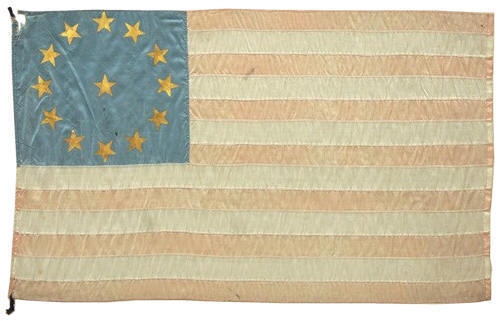|
 Silk
flags with gilt appliqué stars dating to the 19th
century are among the finest quality flags made during
the period and are very scarce. The expense of
silk and the special nature of their construction meant
that they were often reserved for specialized uses, most
commonly by military units. This particular flag
of 13 stars dates from the mid 19th century, likely from
the Civil War era. It is a beautiful example of a
silk flag of the period. It is the only
gilt-on-silk flag that I've encountered in a 13 star
pattern. The others that I'm aware of, including
the 42 Star Medallion example
IAS-0151 and the 34 Star Great Star example
IAS-0105, feature the full complement of stars. Silk
flags with gilt appliqué stars dating to the 19th
century are among the finest quality flags made during
the period and are very scarce. The expense of
silk and the special nature of their construction meant
that they were often reserved for specialized uses, most
commonly by military units. This particular flag
of 13 stars dates from the mid 19th century, likely from
the Civil War era. It is a beautiful example of a
silk flag of the period. It is the only
gilt-on-silk flag that I've encountered in a 13 star
pattern. The others that I'm aware of, including
the 42 Star Medallion example
IAS-0151 and the 34 Star Great Star example
IAS-0105, feature the full complement of stars.
The faded colors of this flag are particularly
beautiful, and the gilt stars, which do not fade, stand
out in stark contrast to the powder blue canton and pink
faded stripes. The presence of a rope in the hoist
and separation in the top corner of the canton suggests
that the flag was flown outdoors for a period of time.
The use of this flag is somewhat speculative, but its
small size, at just 13 inches high and 22 inches wide,
would limit its military use to that of a small flank
marker, a custom camp color, or perhaps a personal
command flag for a unit commander. The
gilt-on-silk construction of the flag and the precision
alignment of the applied stars indicates that the flag
was of the highest quality manufacture. The
pattern of a circular or oval wreath of 12 stars around
a single central star is known as the 3rd Maryland or
Cowpens pattern and it is rare among the known patterns
of 13 star flags. It is the pattern thought to
have been carried by the 3rd Maryland Regiment during
the famous 1781 Revolutionary Battle of Cowpens in which
General Daniel Morgan defeated Lieutenant Colonel
Banastare Tarleton's forces in one of the most decisive
and significant American victories of the war.
Overall, this beautiful and fragile flag has remained
remarkably intact, a unique example among its other 13
star peers.
|

